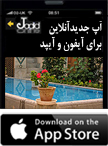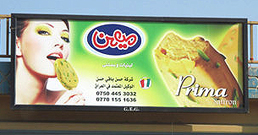Lucinda H. Dunn
A girl dressed in a hejab and manteau is inspecting a shop window while her friend inside purchases beauty products. Her manteau was made in Iran and she bought it across the road at Bawar supermarket. But she is Iraqi and this is the “massif” Mountains in Salahaddin, about half an hour outside Erbil, the capital of Kurdistan Iraq.
She is one of many families who during the troubled years under Sadaam Hussein took refuge in Iran and for whom Iranian culture has now become her own.
During the civil war in 1974 swathes of Kurds fled to Iran not to return until as late as 1992, once the safe zone had been established. With a generation of Iraqi Kurdish children brought up and educated in Iran, it is estimated that there are more than ten thousand Farsi speakers in this region.
Bawar supermarket attendant Pooya, an Iranian Kurd now living in Iraq for four years, explains the extent to which Iranian culture has penetrated the local culture here:
“Those who have come back from Iran really like Iranian products: Iranian cuisine, Iranian clothes, everything. Here in the massif they still wear Iranian manteaux; I even hear them speaking Farsi with their children.”
Via a warehouse in Diyana, Bawar imports Iranian foods such as split peas, various types of beans, ghormeh sabzi (herbs) dried barberries, rice, sweets and sugar cubes. But the Iranian manteaux apparently sell the best. It would seem the “type Irani” (Iranian style) remains popular even though the women are no longer obliged to cover themselves.
Next to the supermarket is a restaurant serving Iranian food. The chef, Hossein, is Iraqi but was born in Iran where he started working in restaurants from the age of four: “I can cook all kinds of Iranian food: kebab, stews, joojeh, chenjeh, shishlik, barg. We have lots of customers.”
At the Salahaddin State University, the oldest in Erbil, the Persian Department has been teaching Farsi and Persian literature since 1998. It has seven teaching staff and over 150 students.
Head of Department Mahdi Khoshnam, himself half Iraqi-half Iranian, says Kurds continue to study Persian for political, social and cultural reasons. He also points out that as two Indo-European languages, Kurdish and Farsi have common roots. With its rich heritage, Iranian literature has been a major influence for Kurdish writers such as Nali, Besarani and Mawlawi Tawagozi.
This cultural proximity is now facilitating greater economic exchange as well. With its relative political stability and recently acquired oil wealth, the Kurdistan region is a new market with enough potential to draw Iranians themselves to cross the border.
“Here people like Iranians and there is not a big cultural gap with Iran. It is a great place to work, because the system is new and we can easily find our place. They have a great need,” says Faramarz Sedighi, an Iranian tradesman who moved to Iraq five years ago and currently works as the agent for an Iranian food company.
Dr Homayoun came to Kurdistan from Tehran two and a half years ago as the representative for a major Iranian pharmaceutical company Cinnamed. “We have been successful so far and our business has developed quickly. I am not Kurd, I am Azeri, so I am fluent in Farsi and Turkish but it only took me a few months to familiarise myself with Kurdish, seeing as the languages are thankfully quite close. I have found lots of good friends here. Those Iranians who work here don’t feel homesick,” he explains.
Recognising this, the Iranian Consul General in Erbil, Sayid Azim Hoseyni, describes the relationship between Iran and the Kurds as "particularly special due to our proximity and shared history". He says the Consulate already facilitates cultural exchanges in the form of book fairs and visits between Kurdish and Iranian universities but with so many Farsi speakers here they know they need to do more. In the next couple of months they will open a Persian Cultural Center to offer language classes and cultural events, located next to the Consulate.
Culture itself can also be an economic opportunity. Last year, the Erbil-based promotional company Babylon began organising sell-out Iranian concerts here.
After Shahram and Shohreh Solati in April 2009 and Moin Isfahani and Jamshid in September 2009, 10,000 Iranians once again flooded the capital in March during Nowruz to see famous Iranian pop stars Ebi and Leila Forouhaar.
“Iranian people really like Ebi and Leila so they have come here to express their support for Iranian artists. Bordering towns to Iran are much better for these events. Here is better than Dubai because it is cheaper and easier to get to,” says Jila, a fan queuing impatiently outside the concert.
Salwan Zaito, Babylon’s General Manager says he thinks these concerts are opening a big door for the economy of Kurdistan and for the culture between Iran and Iraq.


